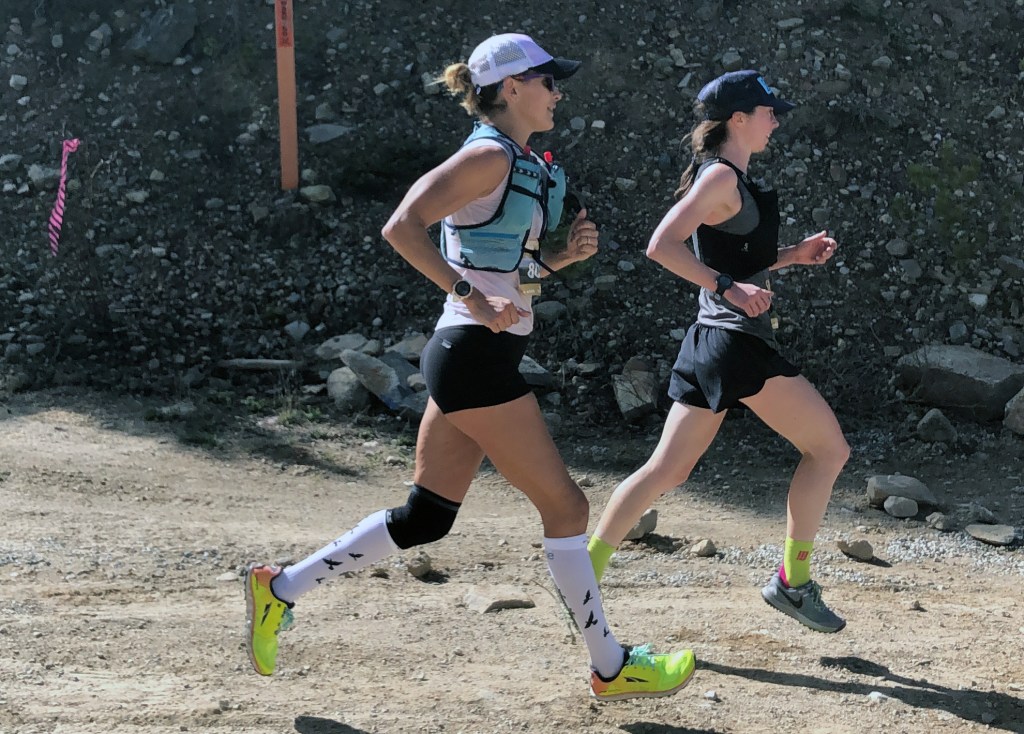In her mind, Kara Goucher knew running away from the mountain lion was wrong, but still, when you’re faced with a 200-pound predator, it’s hard not to instinctively flee. All turned out well, but the recent encounter near her home in Boulder, Colorado, was a perfect metaphor for Goucher’s latest challenge: running Colorado’s Leadville Trail Marathon in mid-June, where she wanted to give up and run away, but instead, she managed to stand tall and stick it out.
Forty-year-old Goucher is best known for her 2007 world championship medal in track and her third-place finish at the 2009 Boston Marathon. She built her career running on roads. But after an injury forced her to DNF the Houston Marathon this past January, Goucher began looking for something different. “The trails provide a break from the headlines, from the intensity and pressure,” she said. “I have no knowledge of times or what the top women are doing [in trail running], and that’s refreshing.”
Training for the Leadville Marathon, which took place June 13, felt like a radical change from the norm. Running on trails, she’s learned, is a whole new game. “When I first started, I only ventured out a couple of times per week because it was so different,” she said.
Slowly but surely, however, she began adding more dirt to her routine, and now she’s regularly on trails three times each week. “I get in one long run, one technical and one hard effort,” she said. “My other runs are on the road.”
While she lives at over 5,000 feet, the Leadville course hits a high of over 13,000 feet at Mosquito Pass. To prep, Goucher incrementally increased her vertical mileage. “That’s foreign to me, so I couldn’t do it too often,” she said. “I started with 1,500 feet of gain in a run and eventually increased to 4,000. Toward the end of training, I tried to get to over 8,000 feet once a week.”
Goucher also included hill repeats in the mix. “I have a one-mile climb behind my house, so I used that for repeats,” she said. “Doing a run with 4,000 feet of climbing in it is no joke.”
For the most part, Goucher’s training has been self-directed, and that’s by design. “A few coaches and runners reached out to me with advice, and I checked in with my own coaches every couple of weeks, but that’s it,” she said. “I wanted to go at my own pace and take what my body had to give.”

Goucher raced at the Leadville Marathon, one of her first major trail-running races. (Photo Credit: Shanna Burnette)
Taking it to the trails on this level was a new experience for Goucher and she learned some lessons along the way. Her tips for others making the transition? Get yourself a good pair of shoes and a hydration pack. “You need to be able to take supplies with you on your runs and carry proper nutrition and essentials,” she said. “You also want to trust your feet on new terrain.”
She also said to be prepared for runs to take longer than you expect. “The terrain will slow you down, so adjust your pace expectations and focus on how you’re feeling,” she said. And let the trail community in. “This is the friendliest group of people I have ever met,” she said. “Let them show you around and don’t be afraid to ask for advice. They will help you transition and prepare.”
On race day at Leadville, Goucher said she made the typical newbie mistake: taking it too hard from the start. “I was through 10K more than 12 minutes faster than I had intended,” she said. “Before I even hit the 12-mile mark, I considered dropping out because I was hurting so badly.”
The bright side? The encouraging spectators. “They would not let me stop,” she said. “Their words carried me all the way to the finish line. Even though it was a painful experience, I loved Leadville.” She finished in 3 hours, 54 minutes, good enough for fifth place in the women’s field.
Goucher hasn’t firmed up her future plans for either the roads or trails, but she is open to options, including ultramarathons. “I will return to the roads at some point,” she said. “But right now, I’m enjoying the experience and getting to call myself a trail runner, one step at a time.”
